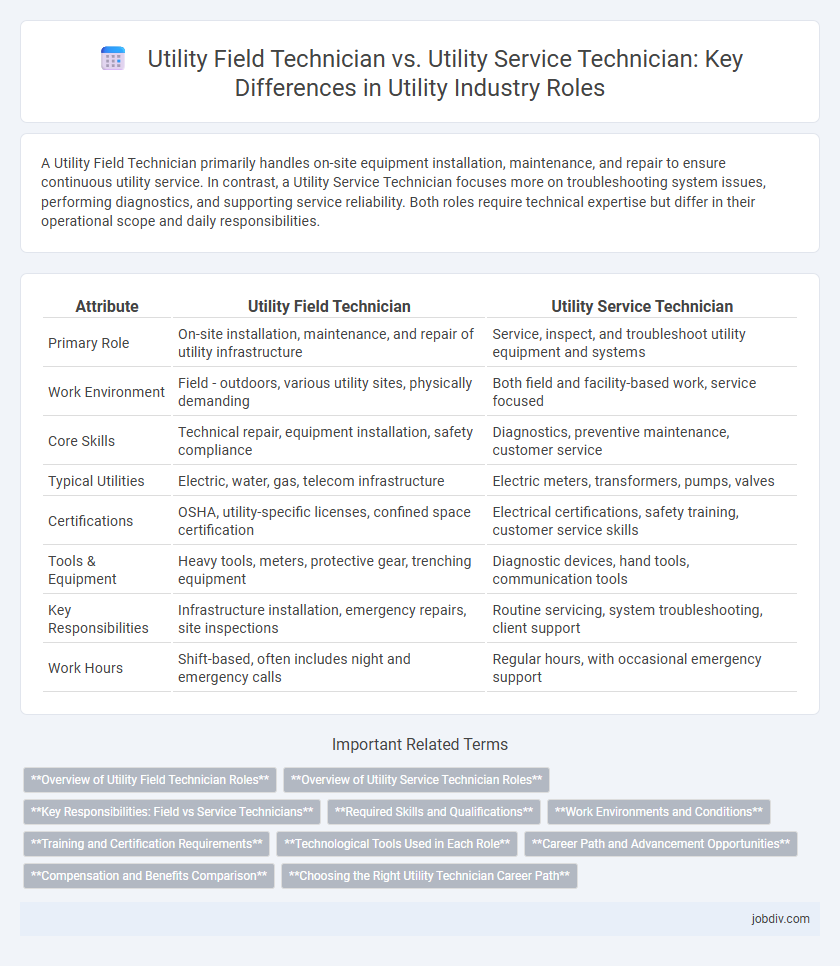A Utility Field Technician primarily handles on-site equipment installation, maintenance, and repair to ensure continuous utility service. In contrast, a Utility Service Technician focuses more on troubleshooting system issues, performing diagnostics, and supporting service reliability. Both roles require technical expertise but differ in their operational scope and daily responsibilities.
Table of Comparison
| Attribute | Utility Field Technician | Utility Service Technician |
|---|---|---|
| Primary Role | On-site installation, maintenance, and repair of utility infrastructure | Service, inspect, and troubleshoot utility equipment and systems |
| Work Environment | Field - outdoors, various utility sites, physically demanding | Both field and facility-based work, service focused |
| Core Skills | Technical repair, equipment installation, safety compliance | Diagnostics, preventive maintenance, customer service |
| Typical Utilities | Electric, water, gas, telecom infrastructure | Electric meters, transformers, pumps, valves |
| Certifications | OSHA, utility-specific licenses, confined space certification | Electrical certifications, safety training, customer service skills |
| Tools & Equipment | Heavy tools, meters, protective gear, trenching equipment | Diagnostic devices, hand tools, communication tools |
| Key Responsibilities | Infrastructure installation, emergency repairs, site inspections | Routine servicing, system troubleshooting, client support |
| Work Hours | Shift-based, often includes night and emergency calls | Regular hours, with occasional emergency support |
Overview of Utility Field Technician Roles
Utility Field Technicians specialize in installing, maintaining, and troubleshooting electrical and water supply systems directly at job sites, ensuring infrastructure reliability and safety. They perform regular inspections, emergency repairs, and system upgrades in diverse outdoor environments, often working with advanced diagnostic tools and heavy equipment. Their role demands strong technical knowledge, physical stamina, and adherence to safety protocols to minimize service disruptions and support utility operations.
Overview of Utility Service Technician Roles
Utility Service Technicians perform critical maintenance, repair, and installation of utility systems such as electrical, water, and gas infrastructures to ensure continuous and safe service delivery. They conduct routine inspections, troubleshoot faults, and upgrade equipment to enhance system reliability and efficiency. Skilled in operating specialized diagnostic tools and adhering to safety protocols, Utility Service Technicians play a key role in minimizing service disruptions and supporting infrastructure sustainability.
Key Responsibilities: Field vs Service Technicians
Utility Field Technicians primarily handle on-site installations, maintenance, and repairs of utility infrastructure, focusing on electrical, water, or gas systems in outdoor environments. Utility Service Technicians specialize in diagnosing, troubleshooting, and resolving technical issues within client facilities, ensuring continuous utility service and compliance with safety standards. Field Technicians emphasize physical infrastructure reliability, whereas Service Technicians prioritize customer service and system functionality.
Required Skills and Qualifications
Utility Field Technicians require strong technical skills in electrical and mechanical systems, proficiency in troubleshooting field equipment, and the ability to work in various weather conditions. Utility Service Technicians need expertise in system diagnostics, customer service skills, and certifications such as OSHA and NERC compliance for safe utility operations. Both roles demand hands-on experience, physical stamina, and knowledge of safety protocols specific to utility infrastructure maintenance and repair.
Work Environments and Conditions
Utility Field Technicians primarily operate outdoors in diverse environments such as power lines, substations, and utility poles, often facing varying weather conditions and physical challenges. Utility Service Technicians typically work both indoors and outdoors, focusing on installing, maintaining, and repairing utility systems within residential, commercial, or industrial settings, where conditions may include confined spaces or exposure to electrical hazards. Both roles require strict adherence to safety protocols and the use of protective gear to handle equipment and prevent accidents in potentially hazardous work conditions.
Training and Certification Requirements
Utility Field Technicians typically require completion of a technical training program in electrical or utility systems, along with certifications such as OSHA safety training and confined space entry. Utility Service Technicians often need specialized certifications in equipment maintenance, such as calibration certificates and industry-specific licenses like NACE for corrosion control. Both roles prioritize ongoing training to comply with regulatory standards and ensure operational safety in utility environments.
Technological Tools Used in Each Role
Utility Field Technicians primarily utilize advanced diagnostic equipment such as multimeters, oscilloscopes, and GPS-enabled devices to perform on-site inspections and repairs of electrical and utility infrastructure. Utility Service Technicians often employ service management software, mobile communication tools, and automated meter reading (AMR) technology to manage customer service requests and monitor utility systems remotely. Both roles increasingly integrate IoT sensors and data analytics platforms to enhance efficiency and predictive maintenance in utility operations.
Career Path and Advancement Opportunities
Utility Field Technicians typically begin their careers performing hands-on maintenance and repairs on electrical or water systems, gaining essential technical skills through on-the-job experience and certifications. Utility Service Technicians often advance by specializing in customer service, system troubleshooting, or supervisory roles, leveraging a mix of field knowledge and communication expertise. Career progression for both roles may lead to senior technician positions, project management, or technical training roles within utility companies.
Compensation and Benefits Comparison
Utility Field Technicians generally receive higher base salaries due to the physically demanding nature and outdoor work environments, with median wages around $25-$30 per hour. Utility Service Technicians often benefit from more comprehensive health insurance packages and paid training programs, reflecting their technical and customer service responsibilities. Both roles typically qualify for overtime pay, retirement plans, and performance bonuses, but differences in compensation largely depend on geographic location and company-specific policies.
Choosing the Right Utility Technician Career Path
Choosing the right utility technician career path depends on understanding the distinct roles and responsibilities between a Utility Field Technician and a Utility Service Technician. Utility Field Technicians specialize in installing, maintaining, and repairing utility infrastructure such as power lines, water systems, and gas pipelines, often working outdoors and in varied environments. Utility Service Technicians focus more on customer service tasks, troubleshooting, and routine maintenance to ensure utility systems operate efficiently, making the choice dependent on whether the candidate prefers hands-on fieldwork or technical service-oriented roles.
Utility Field Technician vs Utility Service Technician Infographic

 jobdiv.com
jobdiv.com